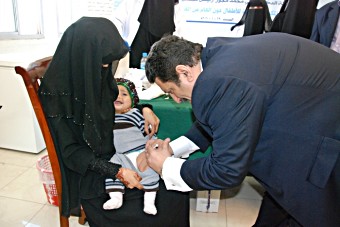Yemen, 29 January 2011 - At 8am sharp in health facilities across Yemen's vast expanse of mountains, deserts and coastland, unsuspecting babies marked a major step forward in child health. These were the first infants in the Eastern Mediterranean region to be given vaccines against the leading cause of pneumonia as part of their country's routine immunisation programme.
Pneumonia is the biggest killer of children under five around the world, as well as in Yemen, where it accounts for approximately 20 per cent of all child deaths. In the capital, Sana'a, that same morning, Prime Minister Ali Mohamed Mujawr presided over the official introduction ceremony.
"With this launch of pneumococcal vaccines today, we are making a quantum leap in combating disease and death in Yemen and towards achieving Millennium Development Goal 4 on reduction of child mortality," said the Prime Minister at the crowded event.
Vaccine support
With this launch of pneumococcal vaccines today, we are making a quantum leap in combating disease and death in Yemen and towards achieving Millennium Development Goal 4 on reduction of child mortality. Ali Mohamed Mujawr, Prime Minister, Yemen |
The Prime Minister then looked on as Minister of Health Dr. Abdulkarim Rasae injected four month-old Rinad Ibrahim Ismael, cradled in the arms of her mother, with the new vaccine.
Dr. Rasae, a professor of pediatrics and also a GAVI Alliance board member, said immunisation was protecting children in his country against deadly diseases that had been stealing its children. He was happy to have lived to see pneumococcal vaccines in Yemen, he said, "It is my biggest dream, as a pediatrician and as a Minister. This will make a big difference in cutting the number of child deaths in Yemen."
GAVI, which has contributed approximately US$60 million in vaccine support to the Government of Yemen over the past ten years, has also supported this introduction. GAVI and its partners aim to assist in rolling out pneumococcal vaccines in more than 40 of the world's poorest countries by 2015, which could avert approximately 700,000 deaths by 2015 and up to seven million deaths by 2030.1
Commitment to immunisation

Vaccinations are underway across the country with pneumococcal vaccines available at all health centers from 8am on the day of the launch.
Source: Porter/GAVI/2011
Mercy Ahun, Managing Director of GAVI's Programme Delivery department, praised the commitment of the Yemen to protecting the health of its children through immunisation. "Yemen is one of the countries leading the way in the fight against pneumococcal disease," she said at the launch ceremony.
She also commended the Government of Yemen for its commitment to financial sustainability and co-financing of the vaccines it receives through GAVI funding. "Pneumonia is the leading killer of children around the world and it is a distressing illness to see in children," she added. "The introduction of pneumococcal vaccines will protect children against pneumococcal pneumonia, as well as from meningitis and other illnesses caused by the pneumococcus bacteria."
Outreach campaign

Minister of Health Dr. Abdulkarim Rasae gives the symbolic “first shot” of pneumococcal vaccines to four month-old baby Rinad.
Source: Porter/GAVI/2011
Plans for the launch of the vaccines began last August with the Ministry of Health undertaking a major outreach campaign to inform parents about the dangers of pneumococcal disease and emphasising the importance of vaccination. The Ministry even negotiated an agreement with a Yemeni mobile phone carrier to send SMS messages to its clients ahead of the launch, informing them about the vaccine.
"We wanted to create momentum around this launch, so that people would understand how necessary it is to have their babies vaccinated" said Dr. Magid Al Gunaid, Deputy Minister for Primary Health Care. "And that is why it was so important to make sure we got the vaccine out to every single health facility across the country before the launch. We did not want any parents bringing their babies for vaccination only to find there was no pneumococcal vaccine available."
For a country with its population spread out in so many hard to reach places, Yemen has a high vaccination coverage rate: over 80 percent according to Ministry of Health estimates. Only half of Yemen's population of more than 23 million is currently served by a health facility, so in order to reach babies with vaccines, health workers regularly set out in vehicles, bicycles and on foot with cold storage boxes filled with vaccines to reach more out-of-the-way patients.
Cost-effective
Italy, the United Kingdom, Canada, the Russian Federation, Norway, and the Bill & Melinda Gates Foundation contributed a total of US$ 1.5 billion to an innovative financing mechanism called the Advance Market Commitment (AMC), which has helped to make the rollout of these new-generation pneumococcal vaccines possible within a year of their introduction in rich countries and at a fraction of the price charged in rich countries. The roll out of pneumococcal vaccines under the AMC began in Nicaragua in December last year. So far, Honduras, Guyana, and Sierra Leone, as well as Yemen, have also introduced the vaccine and a major launch will be held by the Government of Kenya on February 14 this year. |
With such limited access to health care, preventing disease where possible is especially important. Many speakers at the launch also emphasised that not only was it preferable for moral reasons to prevent children from becoming ill with preventable diseases, but that immunisation was the most cost effective health intervention.
"Vaccines target people before they get diseases," noted Dr. Magid. "So for every dollar we invest in vaccination, we save twenty dollars in health-care and other related costs. That benefits not only the child and the family, but also the entire community and the country."
1 Based on the latest Strategic Demand Forecast v2.0
